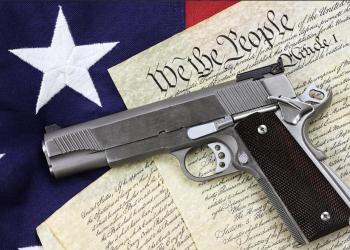By Robert Phillips
Deputy District Attorney (Ret).
Set to go into effect on July 1, 2023, is new California Civil Code §§ 3273.50 to 3273.55 (AB 1594), authored by Assembly Member Phil Ting (D-San Francisco). The meat of this new legislation is contained in subdivision (c) of section 3273.51, and section 3273.52. Section 3273.51(c) mandates that a “firearm industry member shall not manufacture, market, import, or offer for wholesale . . . or retail sale a firearm-related product that is abnormally dangerous and likely to create an unreasonable risk or harm to public health and safety in California.”
Subdivision (c)(2) of this section provides that there is “a presumption that a firearm-related product is abnormally dangerous and likely to create an unreasonable risk of harm to public health and safety if any (italics added) of the following are true: (A) The firearm-related product’s features render the product most suitable for assaultive purposes instead of lawful self-defense, hunting, or other legitimate sport and recreational activities. (B) The firearm-related product is designed, sold, or marketed in a manner that foreseeably promotes conversion of legal firearm-related products into illegal firearm-related products. (C) The firearm-related product is designed, sold, or marketed in a manner that is targeted at minors or other individuals who are legally prohibited from accessing firearms.”
Civil Code § 3273.52(a) & (b) says that a violation of the above that results in “harm” to any person will, as a consequence, provide that person with the right to sue the company that “manufacture(d), market(ed), import(ed), or offer(ed) for wholesale . . . or retail sale a firearm-related product that is abnormally dangerous and likely to create an unreasonable risk or harm to public health and safety in California.”
Civil Code § 3273.52(c) says that in addition to the one harmed, the Attorney General, a city attorney, or county counsel, may also file a lawsuit. The plaintiff in such a lawsuit may ask for injunctive relief, damages, attorney’s fees and costs, and “any other appropriate relief necessary to enforce” the provisions of Section 3273.51. (Subd. (d)) If it is proved that “(t)he firearm industry member’s action or failure to act created a reasonably foreseeable risk that the harm alleged by the claimant will occur,” and “(t)he firearm industry member could have established, implemented, and enforced reasonable controls to prevent or substantially mitigate the risk that the harm would occur,” then there is created as a result a rebuttable presumption “that the firearm industry member failed to implement reasonable controls.” (Subd. (e)(1)) If such a rebuttable presumption is established, then it becomes the “firearm industry member(s) . . . burden (to prove) by a preponderance of the evidence that the firearm industry member established, implemented, and enforced reasonable controls.” (Subd. (e)(2))
All these vague standards of proof become problems for a jury to decide. But the bottom line is that gun manufacturers, marketers, importers, and dealers (wholesale and retail) are potentially liable in a civil suit for any harm (with the term “harm” left undefined) caused by the misuse of a firearm.
In this regard, it is particularly notable that subdivision (f) of Section 3273.51 specifically provides that an “intervening act by a third party, including, but not limited to, criminal misuse of a firearm-related product, shall not preclude a firearm industry member from liability under this section.” In other words, those who commercially put a gun out on the street (at least if that gun is found to be “most suitable for assaultive purposes,” whatever that means) are potentially civilly liable for that gun’s misuse by a robber, killer, or other criminal despite the lack of any logical connection between the manufacturer, seller, etc., and that criminal.
Not surprisingly, some Second Amendment/gun-rights activists finally sued to prevent the implementation of this new law. In National Shooting Sports Foundation v. Bonta; (No. ‘23CV0945 AGS KSC), a civil suit was filed in the federal U.S. District Court for the Southern District of California for “declaratory, injunctive, or other relief,” challenging the constitutionality of the above statutes. Governor Newsom signed this bill just weeks after the U.S. Supreme Court issued the decision of New York State Rifle & Pistol Association, Inc. v. Bruen (2022) 597 U.S. __ [213 L.Ed.2nd 387; 142 S.Ct. 2111]. (See discussion of this issue in People v. Alexander (May 11, 2023) __ Cal.App.5th __ [2023 Cal.App.LEXIS 366]; California Legal Update, Vol. 28, #6.) Basically, the Bruen case strengthened the legal theories supporting the right of private citizens to bear arms.
On its face, it may be difficult to see the connection between the law as dictated in Bruen and the issue of one’s civil liability for manufacturing or selling certain classes of firearms. The National Shooting Sports Foundation (or “NSSF”) case attempts to surmount this hurdle, however, with the argument that; “(t)his law is openly hostile to the firearm industry and also defiant to Congress, the U.S. Supreme Court and the Constitution. Governor Newsom’s angst toward the foundations of America’s freedoms exceeds the borders of his state and his law attempts to exert California’s radical gun control agenda across the United States. NSSF will defend our Constitutionally-protected industry against the broadsides of this extremist agenda.” (Argument made by Lawrence Keane, NSSF senior vice president and general counsel.)
So with this lawsuit pending, it is unknown at this time whether the implementation of California Civil Code §§ 3273.50 et seq. will in fact occur on July 1, as scheduled, or whether these new statutes will be stayed pending the litigation of this civil suit. So stay tuned.

